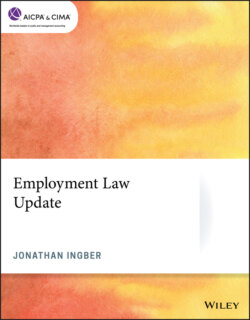Читать книгу Employment Law Update - Jonathan Ingber - Страница 27
How discrimination, civil rights violations (including harassment), and retaliation cases get to court
ОглавлениеA person who believes he or she has been the subject of most types of discrimination, civil rights violations (which include harassment), or retaliation cannot simply head to federal or state court and file suit. Instead, the person wishing to sue is first required to file a complaint — known as a charge — with the EEOC within 180 days of the occurrence of the alleged wrongful act. In some cases, charges may be filed for up to 30016 days after the alleged wrongful act. If the aggrieved party wishes to file a state charge, different time frames may apply to when the charge must be filed with the state EEOC.
Suits alleging age discrimination or violations of the Equal Pay Act are not subject to the requirement that the aggrieved party first file a charge with the federal EEOC. Most state employment laws have similar exceptions for these types of state claims, although state laws are not uniform and may contain different or no exceptions.
The EEOC and similar state agencies generally coordinate investigations when employees allege violation of federal and state laws and have filed charges with both the EEOC and a state agency. When this occurs, the EEOC and state agency will agree on which agency will lead the investigation and which will assume a passive role. If the investigating agency finds that no violation of laws has occurred, the non-investigating agency will typically defer to that finding. Due to budget constraints and other factors, a claim filed only with a state EEOC will sometimes be referred by the state EEOC to the federal EEOC for evaluation.
Employees, former employees, and applicants often have different rights under federal and state employment laws. The attorney for the employee, former employee, or applicant will generally file a charge with state agencies in situations in which state law provides the charging party with additional claims or more expansive recovery rights. Conversely, if state law is more restrictive than federal law, the charge will usually be filed with the federal EEOC. If federal and state laws and remedies are identical, the choice of where to file suit once a notice of right to sue is issued often depends on which venue is perceived to offer a more rapid resolution and whether the attorney for the charging party has more experience with a particular venue.
Special note: The differences between federal and state employment laws may result in small businesses being sued more often under state law. Here is an example: California's anti-discrimination laws apply to employers — including the state, counties, cities, and businesses — with five or more employees, whereas federal anti-discrimination laws apply to employers with 15 or 20 employees, depending on the type of discrimination.
The following exhibit outlines how the charging process works at the federal EEOC. Most states follow a similar process, although the time frames and process details differ somewhat from state to state.
